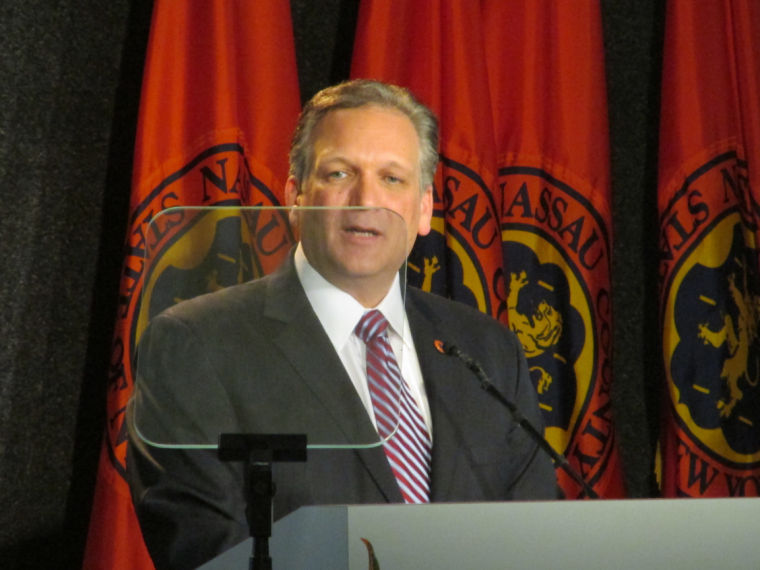Nassau County is getting stronger, according to County Executive Edward Mangano – especially in contrast to its condition under former County Executive Tom Suozzi, who is gearing up for an electoral rematch with Mangano in November.
Mangano’s State of the County address touted his administration’s reductions in government payrolls and hard line on property tax increases, while portraying the county as still on the path to recovery from both Hurricane Sandy and years of recession.
Save and closeAnd Mangano wasted no time in casting the Suozzi administration’s spending habits, Democratic legislators’ refusal to pay off tax refunds with increased debt and “special interest” lobbying as responsible for Nassau’s continued fiscal struggles.
“Ladies and gentlemen, just over three years ago, we inherited a broken Nassau County,” Mangano said – the first words of his speech after he opened with a memorial to fallen police officers and the Legislature’s former Presiding Officer Peter Schmitt (R-Massapequa).
Mangano painted Suozzi, who he did not mention by name, as taxing and spending the county into debt.
“Nassau’s former plan was clear – take more money from taxpayers to feed the out of control spending habits of government,” Mangano said. “Accordingly, I chose the path that made sense; no property tax increases for three consecutive budgets.”
Suozzi, in turn, released a statement ahead of Mangano’s speech accusing the county executive of “reckless mismanagement.” Suozzi pointed to incoming federal Hurricane Sandy aid funds, and argued that those funds should be segregated from the general county budget to prevent Mangano from engaging in shady accounting practices
“Superstorm Sandy federal aid funds, which are vital to our residents, must not be used to mask Mangano’s borrowing and fiscal irresponsibility,” Suozzi said in the statement. “This administration is prone to accounting mischief and budgetary shenanigans and NIFA and the State and County Comptroller should demand that these funds not be commingled with the county’s general operating funds.”
Roslyn businessman Adam Haber, who is running in the Democratic primary against Suozzi in hopes of challenging Mangano in November, accused Mangano of misleading Nassau about the costs of his policies.
“Mangano’s State of the County Address is more of the same, speaking out both sides of his mouth. Mangano says that taxes have not gone up but Nassau’s middle-class families know they are being squeezed by paying more fees, while government services are getting cut,” said Haber in a statement. “We need a change from the status quo of the past two administrations that lurch from crisis to crisis, burden families with fees and taxes and fail to create a way forward. We need long term strategic planning and an efficient government that puts Nassau back on track.”
Mangano pushed back against criticism of his administration for the county’s fiscal troubles, which include the growth in unpaid commercial tax refunds to hundreds of millions dollars and continued oversight of the county’s finances by the Nassau Interim Finance Authority.
Several of Mangano’s fiscal moves, including ending the county guarantee and an employee wage freeze, have stalled due to legal challenges.
Mangano’s effort to repeal the county guarantee, placing responsibility for tax refunds on schools and special districts, was struck down in appellate court after a lawsuit by schools and other affected districts and the county is filing an appeal. The ruling, which Nassau County Comptroller George Maragos has said could cost the county $50 million if it comes into effect, upholds the guarantee, which was passed by the state in 1948 at the request of the county and makes Nassau liable for assessment errors that lead to tax certiorari cases.
“Nassau is the only of 62 counties in the state that is subject to such onerous provisions,” Mangano said. “Powerful lobbyists protect this current inequity, and that’s why my reforms are currently working their was through the courts.”
“The current system works against taxpayers and in favor of the special interests,” Mangano added. “This scheme creates taxpayer liability whereby tax dollars get wasted so special interests can get rich.”
Mangano blamed Democrats for the pileup of unpaid refunds. He called the Democrats’ refusal to finance the refunds with county debt “partisan politics,” arguing that his plan would have both staunched the county’s fiscal bleeding and paid down the debt within ten years.
And Mangano touted improvements in the county’s assessment system, saying that Nassau now settles all residential tax disputed before they become liabilities.
On the economy, Mangano said his economic team was responsible for the creation of 4,000 jobs. He also touted the expansion of the film industry in Nassau and a newly announced request for proposals to develop the Hub, the future of which has been uncertain since New York Islanders owner Charles Wang announced that he would be moving the team to Brooklyn.
Mangano also cited a 10 percent drop in the county’s crime rate, gun buy-back programs and active shooter trainings for schools to demonstrate his commitment to safety in the wake of he mass shooting at Sandy Hook Elementary School.
The county executive praised first responders for their work after Sandy and said that both his administration and Nassau residents had worked hard to lobby the federal government for recovery funds.
“We were successful in lobbying Congress,” Mangano said. “While federal programs are still being formed, we launched efforts to assist our residents, rebuild our critical infrastructure, repair our economy and clean up our environment.”
And as Mangano closed the speech, he returned to its opening themes – small government, and a contrast with what he described as the mismanagement of Suozzi and previous county executives.
“Nassau no longer taxes too high, spends too much or reforms too little,” he said. “We have met each challenge without raising county property taxes.”



